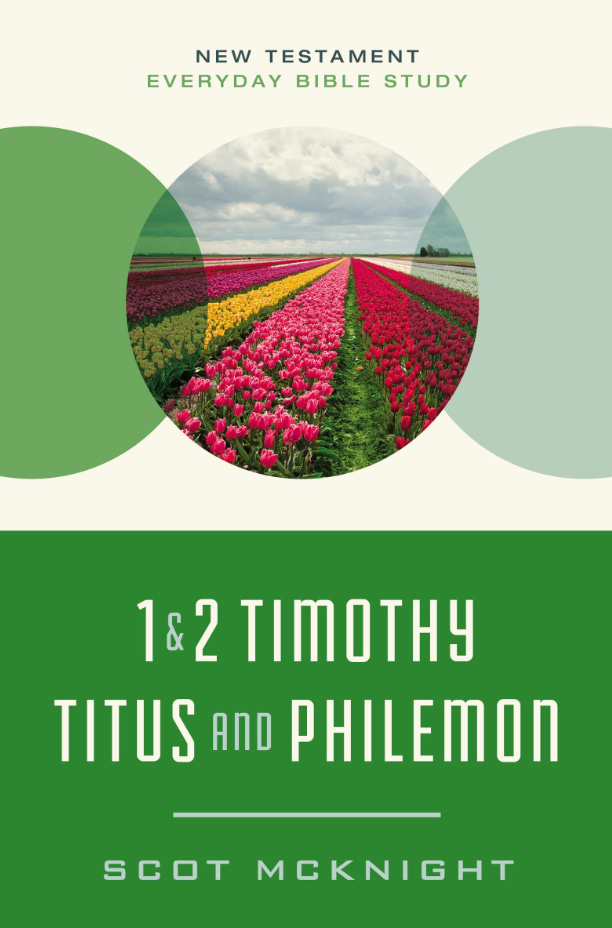From my 1-2 Timothy, Titus, and Philemon, in the Everyday Bible Study series.
Philem. 8 Therefore, although in Christ I could be bold and order you to do what you ought to do, 9 yet I prefer to appeal to you on the basis of love. It is as none other than Paul—an old man and now also a prisoner of Christ Jesus— 10 that I appeal to you for my son Onesimus, who became my son while I was in chains. 11 Formerly he was useless to you, but now he has become useful both to you and to me.
God expresses nothing less than God-ly feelings. David Lamb has recently written about seven of God’s emotions: yes, hatred and wrath, along with jealousy, sorrow, joy, compassion, and love. Each of these terms could be given various translations, but what needs to be seen is that God is not distant, emotion-less, unfeeling, calculating. God is a person, God has relations, God responds to us as we respond to God. That’s step one. Step two is this: We are made in God’s image. If Christ is the perfect image of God, and if Jesus is filled with empathies and compassions and tears and joys and love, then we too are emotional, feeling-shaped images of God. Step three: Paul’s emotions and appeals to emotions come into full display in our passage.
It is not difficult for manipulative types to manufacture feelings in others, or even to fake their own feelings, in order to get what they want. Their “skill” is a fraudulent art form of persuasion. But, as one philosopher said, “Kitsch is fake art, expressing fake emotions, whose purpose is to deceive the consumer into thinking he feels something deep and serious, when in fact he feels nothing at all” (Scruton, Confessions, 9). Perceptive listeners, skilled as they are like a good antiquarian, spot the fake from the genuine. Paul was no fake artist. His feelings tripped on his tunic.
Philemon 8-11 is an emotional appeal to Philemon. And Philemon still does know what for! Feelings are so common for Paul that he may not even realize the emotional power of this paragraph. He may not have, but Philemon did.
Sidebar: Onesimus, the Slave
By all means, let us ponder again what it means to be a slave, a person enslaved. Here is one of the world’s experts, Keith Bradley, defining a slave:
Slavery by definition is a means of securing and maintaining an involuntary labour force by a group in society which monopolises political and economic power (Bradley, Slaves and Masters, 18).
Slavery in the Roman world was about status and integrity and identity, all three reshaped by turning a person into a utility. Most slave were born into slavery, which means perhaps Onesimus’ mother was a slave in Philemon’s household. A slave’s life was dependent upon the master’s character; good and kind masters were better than cruel ones. A male slave remained in the status of a “boy” his entire life, unless emancipated, in order prevent a legal marriage, legal control of (their non-legal marital relationship) children, and thus legal inheritance rights. Slaves were commonly abused physically and sexually.
Onesimus was from Colossae (Colossians 4:9), he probably ran away, which was common, and he was subsequently converted to Christ through Paul (Philemon 10).
Keith R. Bradley, Slaves and Masters in the Roman Empire: A Study in Social Control (New York: Oxford University Press, 1987).
Scot McKnight, Philemon, 6-36.
What happened?
The most common and ancient interpretation of Onesimus is that he was a runaway slave, was converted, and then was sent back to his slave owner, Philemon. Not all agree with this classic interpretation, which is assumed in this study guide and in my commentary on Philemon (see Introduction). Some today think Onesimus did not so much run away but “ran away” only to get Paul to become his advocate with his friend Philemon. In this case, he did not run away as a fugitive, but ran away only to get justice. In which case, he planned from the beginning to return to Philemon. A few think Philemon actually sent Onesimus to Paul for a mission purpose and Paul sent him back, hoping Philemon would then send him back yet again to Paul on a more permanent basis.
Leaders feel relationships
First, Paul appeals to his status when he says “in Christ I could be bold and order you to do what you ought to do” – again, Philemon doesn’t even know yet what this order could have been. Paul degrades his own status as an apostle to motivate Philemon on the basis of a human’s deepest emotion: love (9a). Let’s admit something here: if you tell someone you could order them and then tell them you want them to do something on the basis of love, you’ve backed up your love with your order. I’ll cut Paul some slack and say he wants Philemon to respond to Paul’s (about to be given) Ask because of their personal, emotional relationship of love. It’s an appeal of “Because I love you” or “because you love me” or “because we love one another.”
Leaders feel empathy
Second, he appeals to Philemon’s empathy for Paul’s age and imprisonment (9b). Remember, Philemon still does not know what Paul’s about to ask but he knows now that Paul loves him and that he’s an aged man sitting in come confinement. He’s probably in some house arrest awaiting a court appearance. Imprisonment was not a punishment in the ancient world but a temporary situation prior to a judge’s decision. If you have ever seen someone unjustly confined – say the famous photo of Nelson Mandela visiting his prison cell on Robbin Island – your feelings of empathy, sorrow, compassion may ignite as you read the aged Paul inform Philemon that he is a “prisoner of Christ Jesus” (89b).
Leaders feel family
Third, Paul induces paternal feelings in Philemon – perhaps for Archippus – when he speaks of “my son Onesimus” (10; NIV). The name “Onesimus,” so common for 1st Century enslaved males, means “useful” but also something like “Handyman.” The common word for “son” is huios, but Paul does not use that term here. He uses teknon, which evokes “child” in the faith (“became my” child) and child being mentored into leadership. The same term is used for Timothy (1 Timothy 1:2) and for those whom he led to Christ in Corinth (1 Corinthians 4:13).
Leaders feel conversion
Fourth, if we tie verses ten and eleven together Paul also appeals to the religious, emotional experience of conversion. As Onesiumus, the enslaved person who is the subject matter of this letter, became a believer through Paul while Paul was in prison, so Philemon will hear Paul’s words and as a leader say “I know what happened to Onesimus. It happened to me. We are alike.” The conversion is powerful enough in Onesimus for Paul to play with his name as the man who was formerly useless has become useful.
Paul’s not manipulating Philemon. Instead, he brings a fuller dimension of our personhood into the circle of persuasion. Paul respects emotions, Philemon will have experienced emotions as this letter was read, and they will factor into the decision Philemon is about to make. Emotionless decisions are half decisions, and “going by the book” at times will deny essential elements of what it means to be made in God’s image.
My former student Becky Castle Miller is researching a dissertation on emotions in the Gospel of Luke. She wrote in a recent blog post, “God created us with emotions. Our God-given emotions keep us safe, help us live an abundant life, and motivate us to take action based on our values and goals. Because God is emotional, and Jesus as God incarnate is emotional, it stands to reason that God not only approves of emotion but also intentionally created us as emotional beings. Our emotions are part of being made as God’s image bearers.”
Questions for Reflection and Application
1. How does Paul use emotional appeals to Philemon?
2. What parental emotions might Paul have engendered in Philemon?
3. How do you imagine Philemon felt at this point in hearing the letter?
4. What do you think about the idea of God and Jesus being emotional?
5. How do you approach emotions in your spiritual life? What might it be like for you to become more emotional, like Paul?
David T. Lamb, The Emotions of God: Making Sense of a God Who Hates, Weeps, and Loves (Downers Grove: IVP, 2022).
Roger Scruton, Confessions of a Heretic: Selected Essays (Widworthy Barton Honiton, Devon: Notting Hill, 2016).
On emotions and feelings, which are not identical, I have learned much from Becky Castle Miller. Without her work I could not have written the above study guide.






"It is not difficult for manipulative types to manufacture feelings in others, or even to fake their own feelings, in order to get what they want. Their “skill” is a fraudulent art form of persuasion. " Love this as some men exploit scripture to make women feel they are too emotional and that is wrong. I am also seeing that because I was mistreated in former churches shouldn't erase the miracles God has done in my life for myself and the Kingdom of God!
Thank you